2021: The Year of People vs Big Tech
We take a look back at the origins and key actions from our movement’s first six months – with an eye to what could happen in 2022
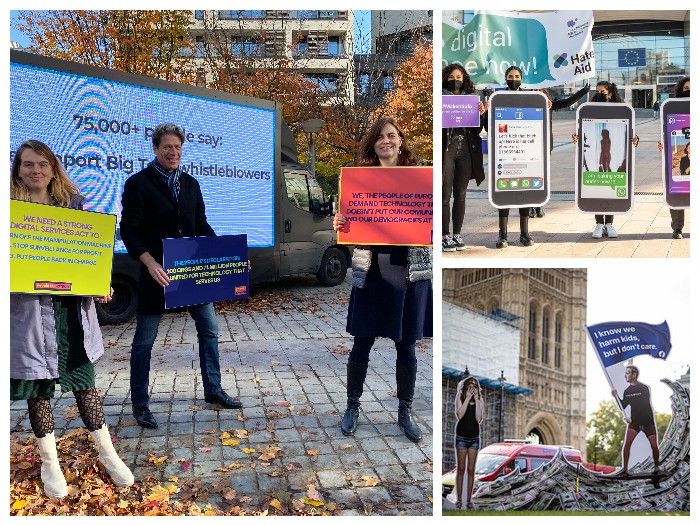
Image caption (clockwise from top left): MEPs Kim van Sparrentak, Paul Tang, and Alexandra Geese join the People Vs Big Tech to show solidarity with tech whistleblowers; HateAid protest against online abuse in Brussels; SumOfUs protest against Instagram’s harms to young people outside UK Parliament.
We take a look back at the origins and key actions from our movement’s first six months – with an eye to what will happen next in 2022.
For years now, Big Tech monopolies like Google and Facebook have conned us into giving our “consent” to grow their vast empires of personal data extraction and surveillance. To them, we are nothing more than users – ripe for commodification, ready for exploitation. And while these corporations have made obscene profits from surveilling us, we the people have been left behind to bear the burden of this devastating business model: an increase in polarisation, a proliferation of lies and hate, and an erosion of our fundamental rights and freedoms.
Fortunately the past few years have seen more and more people waking up to the harms of this data-hungry business model, creating a new sense of urgency and possibility that serious, systemic change can be achieved. But although securing that change will require the passage of new laws, for far too many of us the debates that are deciding what those laws will look like are complex, abstract, and taking place in far away impenetrable policy-bubbles.
Yet with the newly proposed Digital Services Act (DSA) offering a once-in-a-generation opportunity to rein in the Big Tech companies in Europe, the voice of citizens in shaping this watershed regulation has never been more important. Even more so given the sheer amount of lobbying resources being funneled by Big Tech platforms into weakening the proposals. That’s why in 2021, the People vs Big Tech movement was born.
The Origins of the #PvBT Movement
"We're people, not users."
Understanding the importance of reaching beyond the corridors of Brussels and bringing more groups and citizens into the fight for a strong DSA, twelve organisations gathered in June 2021 to create a common vision for action. Rallying under the banner of the People’s Declaration, our growing coalition set out to create a pathway for citizen action and activism. The result was the People vs Big Tech – an open network of civil society organisations and concerned citizens working together to challenge the power and abuses of Big Tech.
Six months later, 113 organisations from 23 of the 27 EU member states and the UK – with a collective membership of 71 million citizens – have signed on to the People’s Declaration. That network has become a ‘pop up’ campaign vehicle that aims to distill the key legislative priorities, highlight moments for action, and amplify opportunities for people-powered mobilisation.
How We Made Our Voices Heard in 2021
“We, the people of Europe, demand technology that serves us, instead of putting us, our communities and our democracies at risk.”
In working to make the demands of the People’s Declaration a reality, we sought to forge a common way to connect the dots between all the powerful work already being done by coalition members, while also turning individual efforts into a collective drumbeat for change that would be noticed by MEPs. To help achieve this goal, we created a hashtag and visual identity that was owned by none and could be used by all.
Examples of the work accomplished by members of our network under the #PeopleVsBigTech banner include:
- Global Witness launched its #PeopleVsBigTech Twitter bot, @EUTechWatch, which tweets every time a meeting is held between an EU official and a Big Tech company.
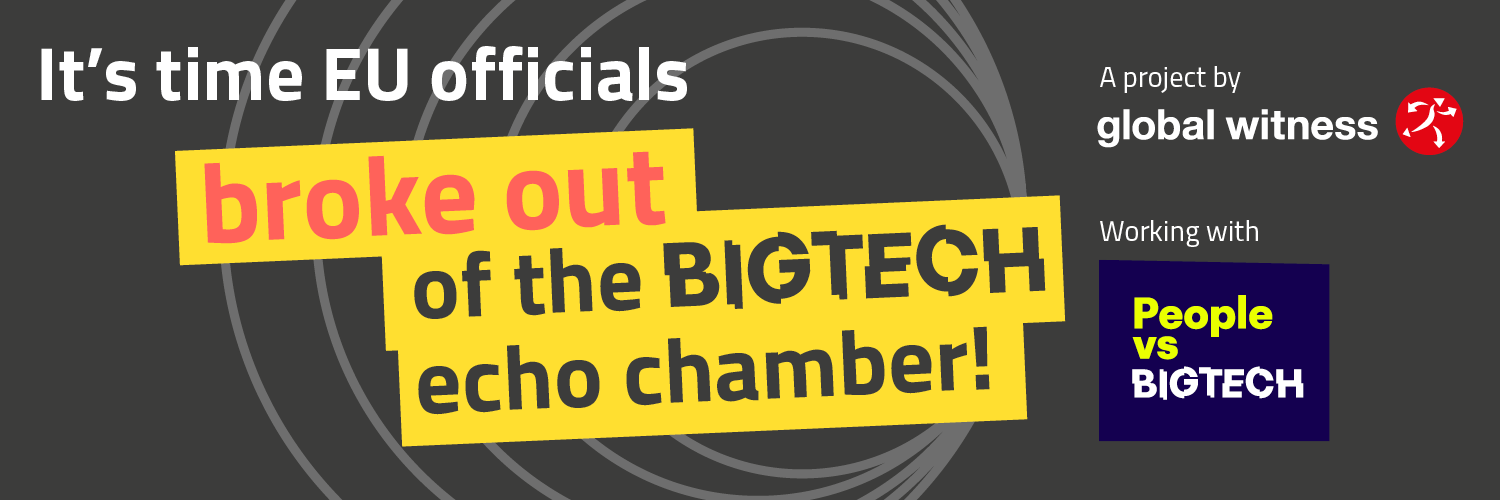
- We teamed up with LobbyControl and Corporate Europe Observatory to turn their bombshell report on Big Tech’s record lobbying expenditures into a #PeopleVsBigTech guide that was sent to all MEPs.
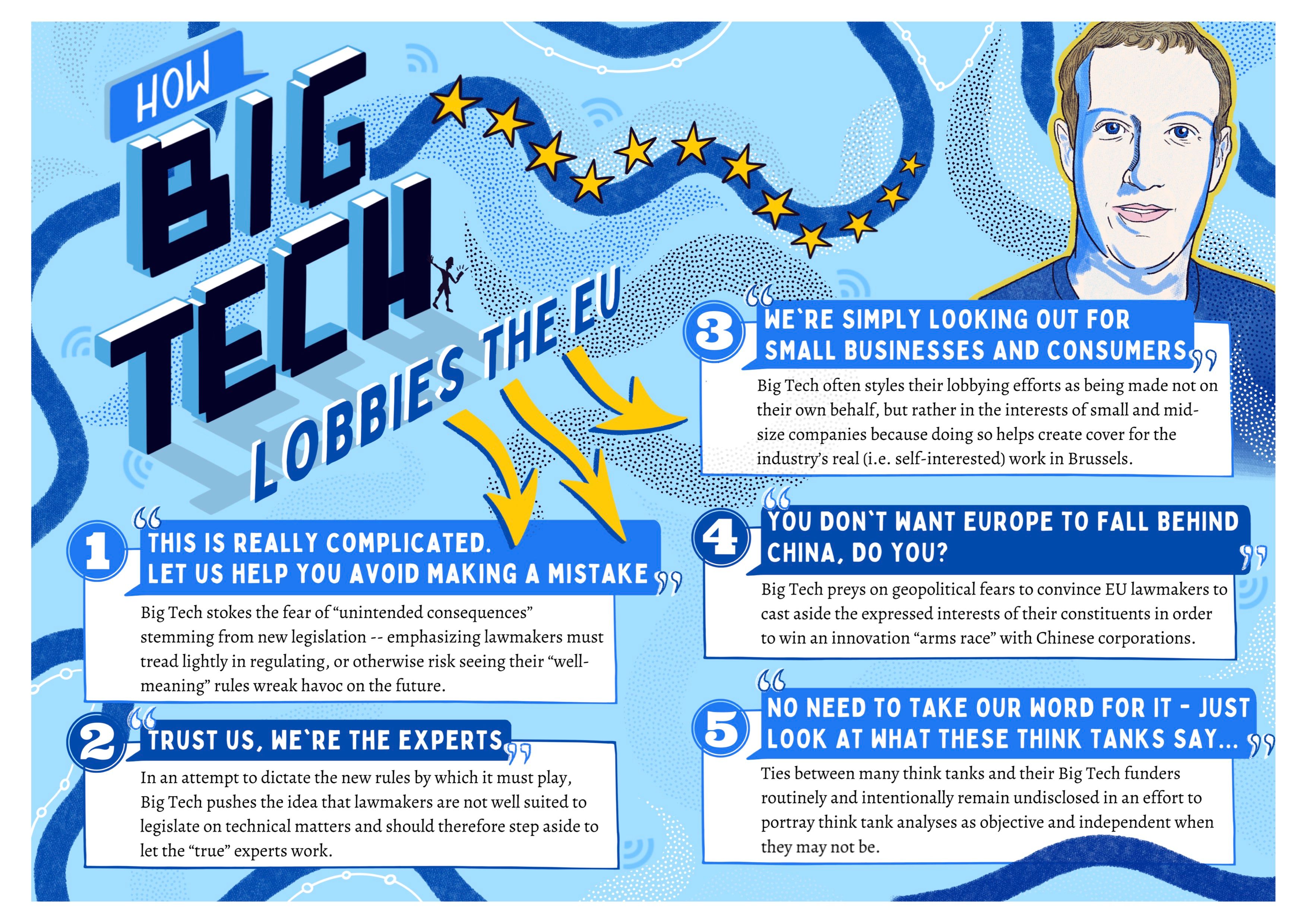
- In Brussels, SumOfUs implored MEPs to not get in bed with Big Tech with a stunt that used #PeoplevsBigTech as a rallying cry.
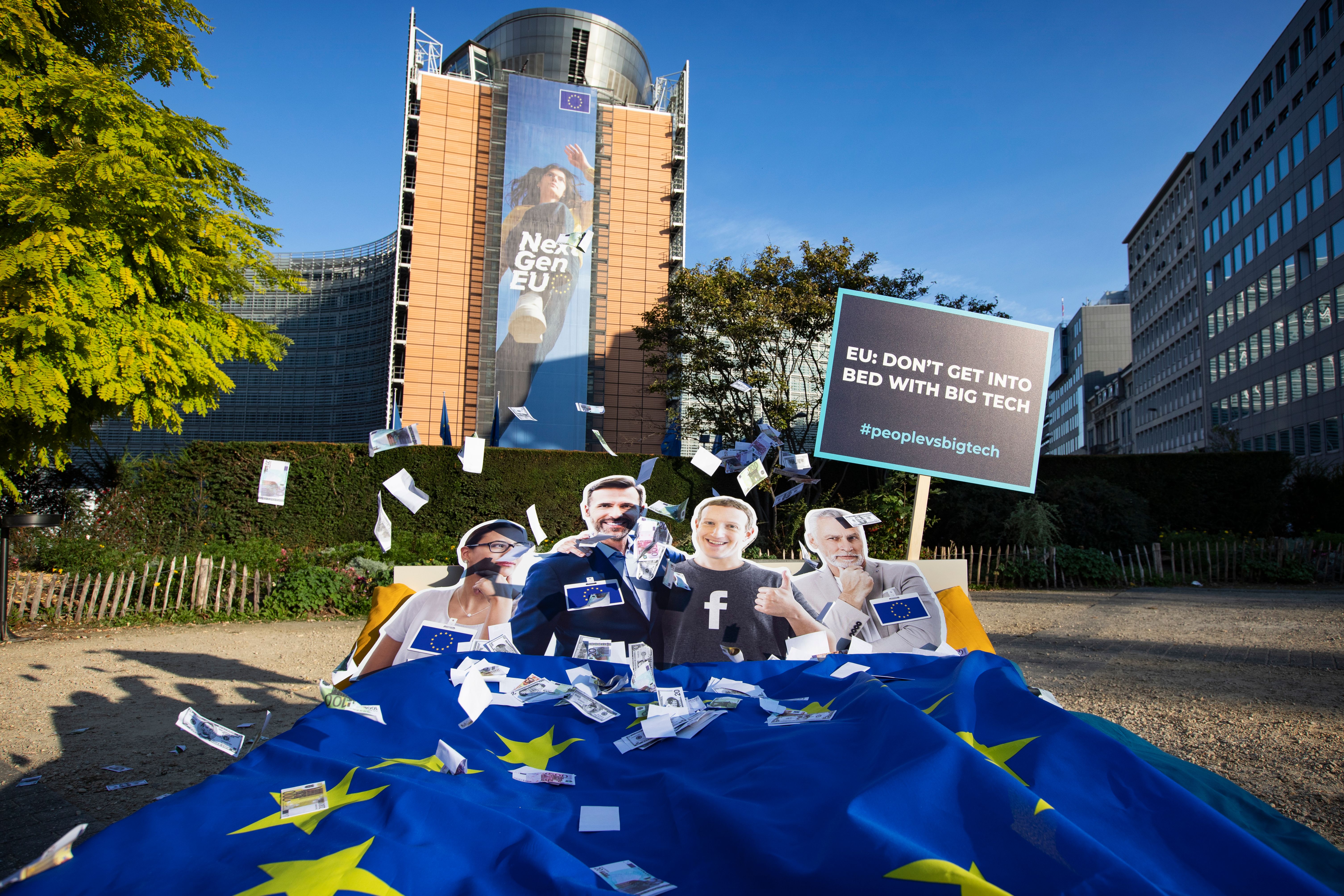
- To help better communicate the risks of algorithmically-amplified harm, Luminate supported the production of a short film with WaterBear, “The Tale of the Heckler”, that can be used by anyone in the network.

- In the wake of Frances Haugen’s pivotal disclosures about Facebook, SumOfUs and HateAid organised stunts at the European Parliament prior to her testimony before the European Parliament, and showed the overwhelming degree of citizen support for whistleblowers.
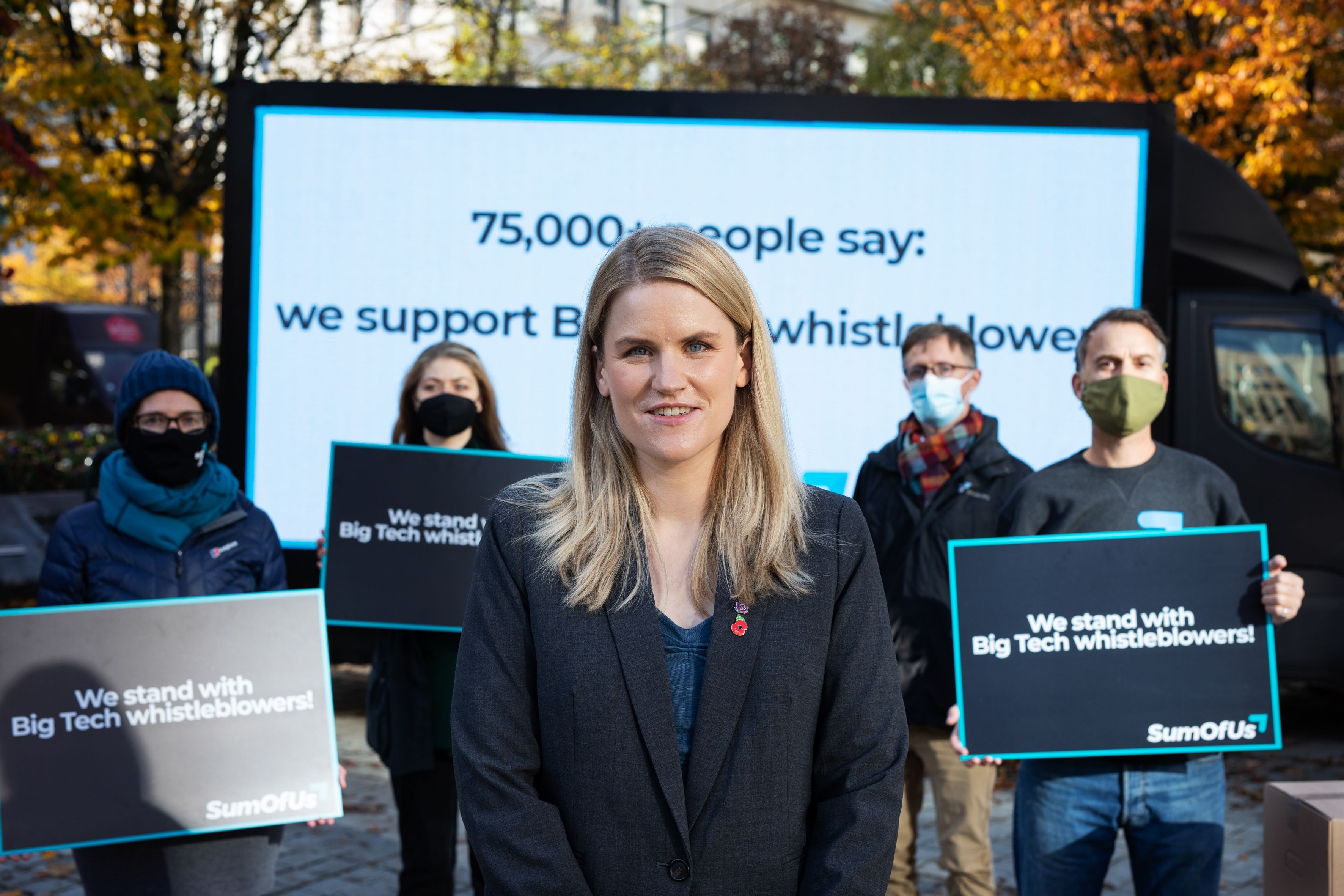
- As part of Uplift’s #FaceUpToFacebook campaign, teenage girls marched on Facebook’s headquarters in Dublin, Ireland, to protest the company’s harmful and dangerous ‘profits before people’ approach.
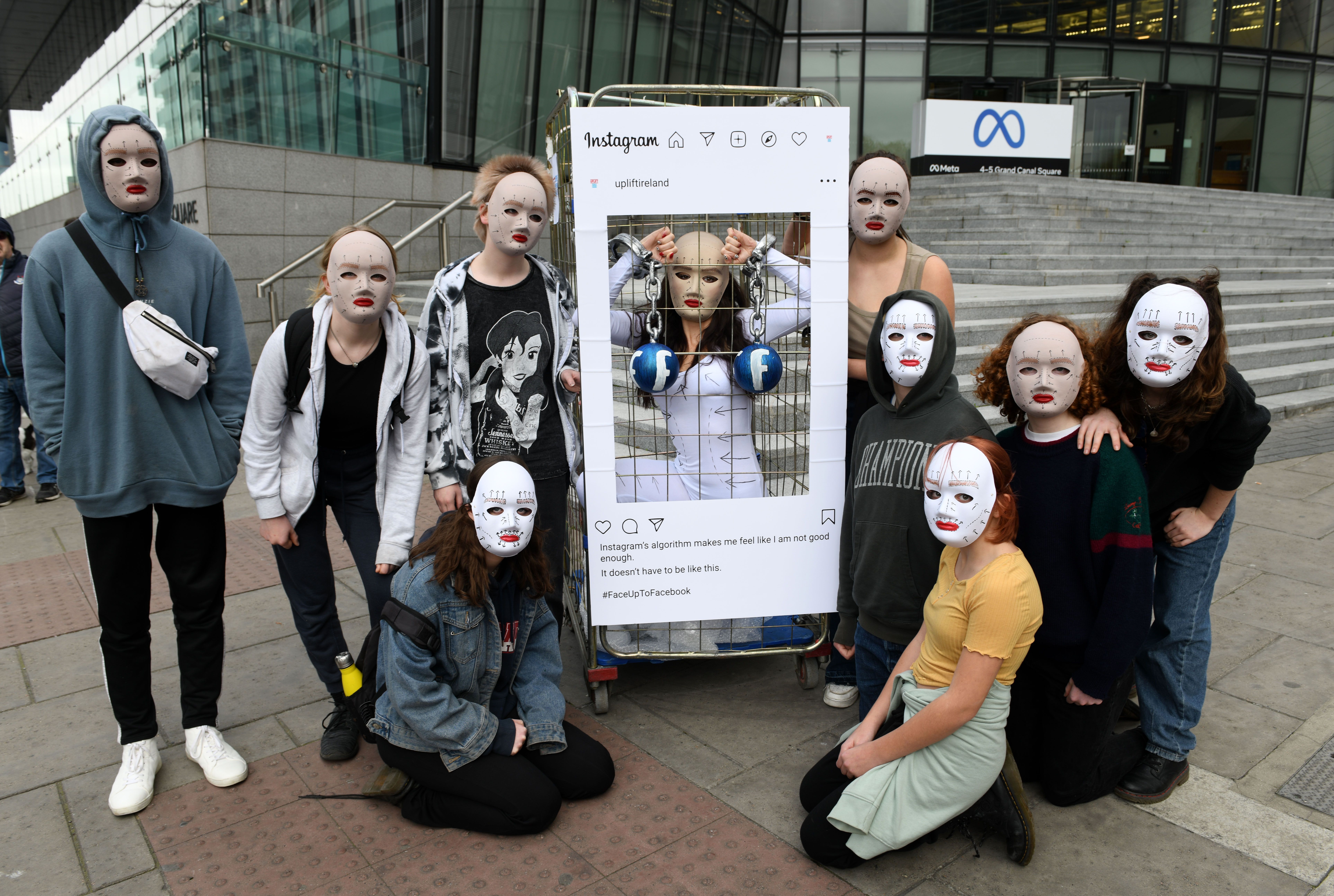
- We teamed up with Waag to run a side event with allied MEPs in the European Parliament addressing ways to fix toxic algorithms and manipulative business models (video here).
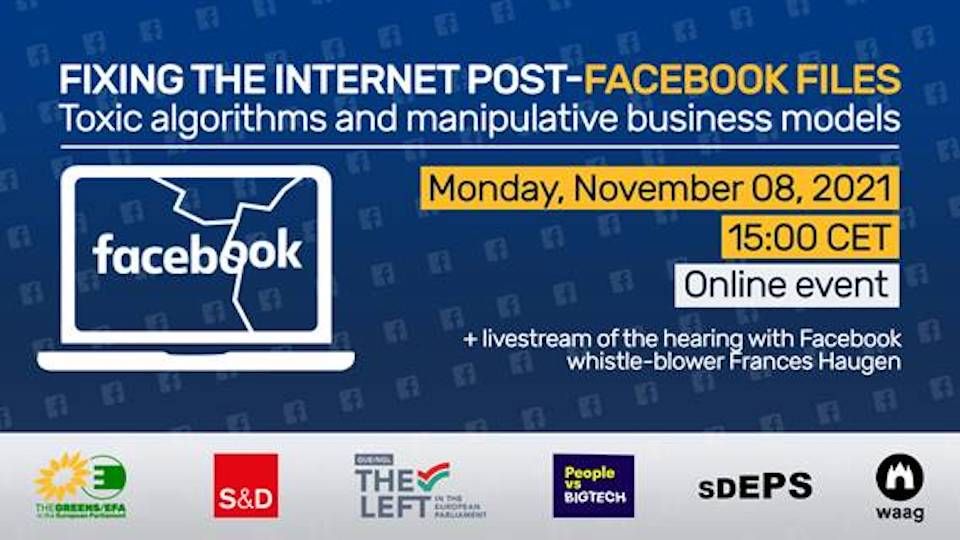
Key Fights in the DSA
Throughout the Autumn and into the Winter, the People vs Big Tech network set our sights on securing key provisions within the DSA. Members of the network – large and small alike – teamed up to mobilise at pivotal moments in the EU Parliament’s negotiations. With members opting in where they saw fit, we took action in the following ways:
- Hundreds of people took part in a Twitter storm targeting the EU Parliament’s Committee on Legal Affairs (JURI) ahead of a crucial vote.
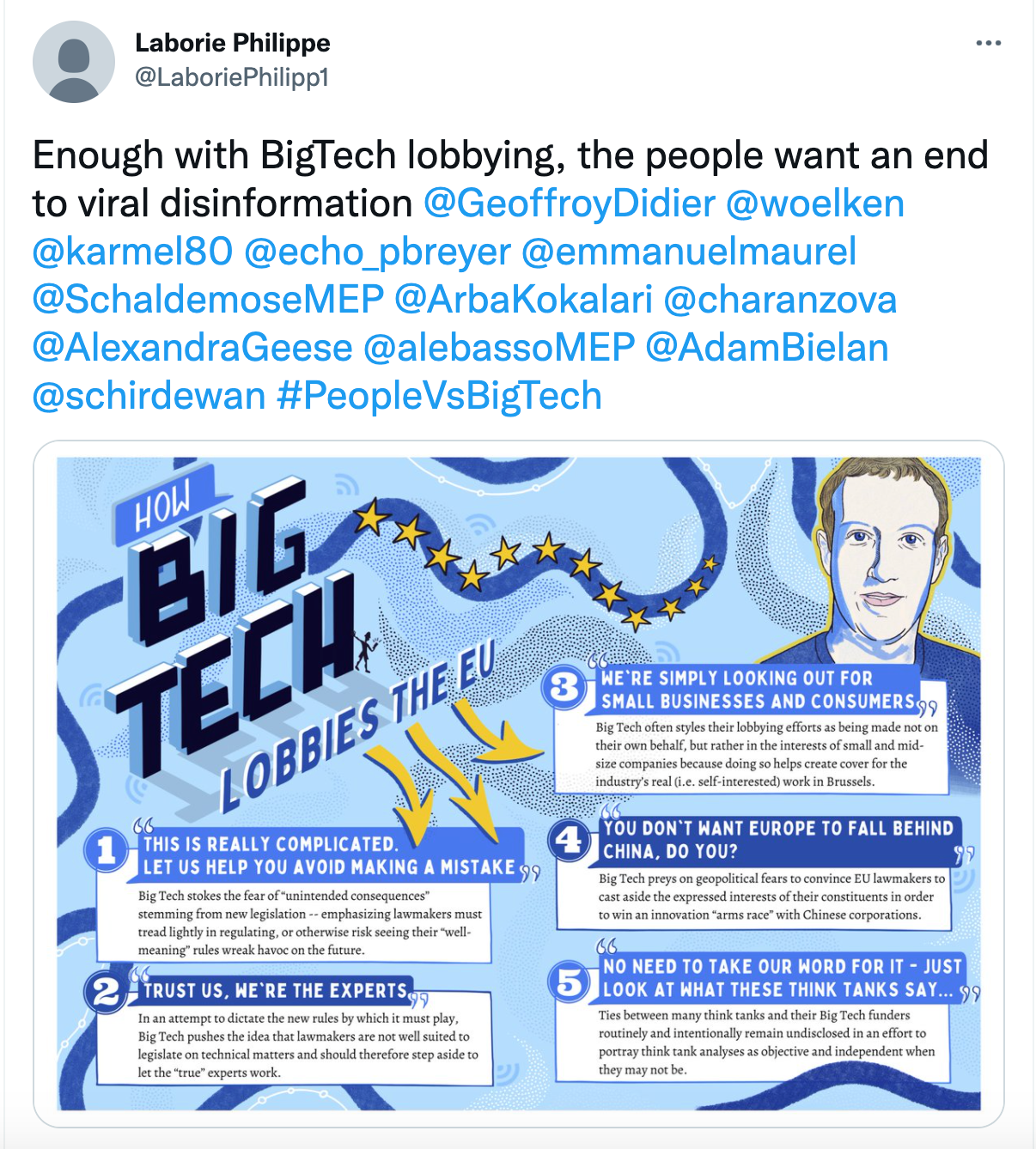
- We mobilised to fight off a threat that would have narrowed the requirement for platforms to undertake risk assessments only for illegal content or content in breach of platforms’ terms and conditions. This critical intervention by many organisations ensured that platforms will be required to consider all algorithmic-harms – not simply those that are illegal or that they choose themselves.
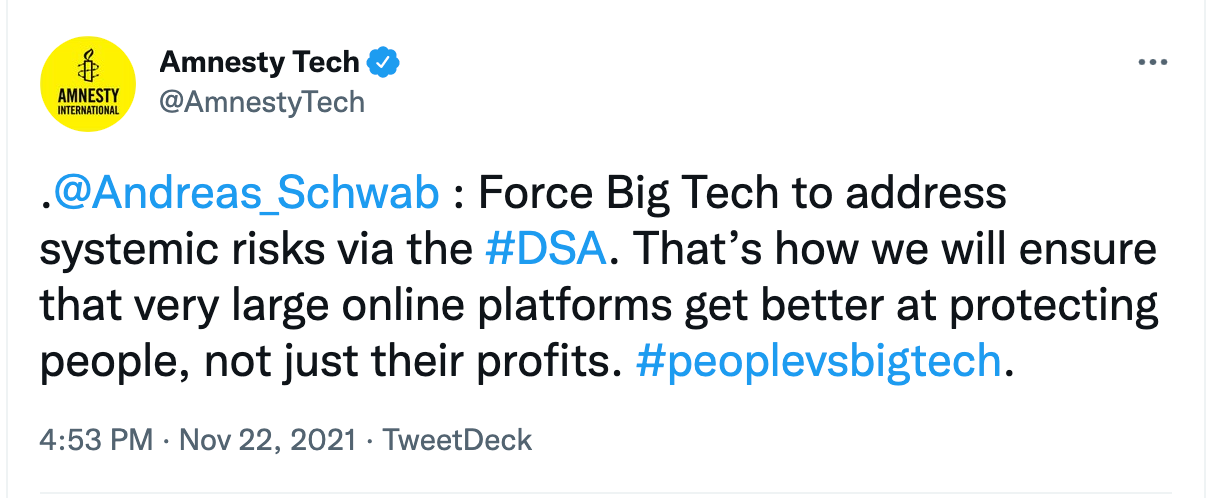
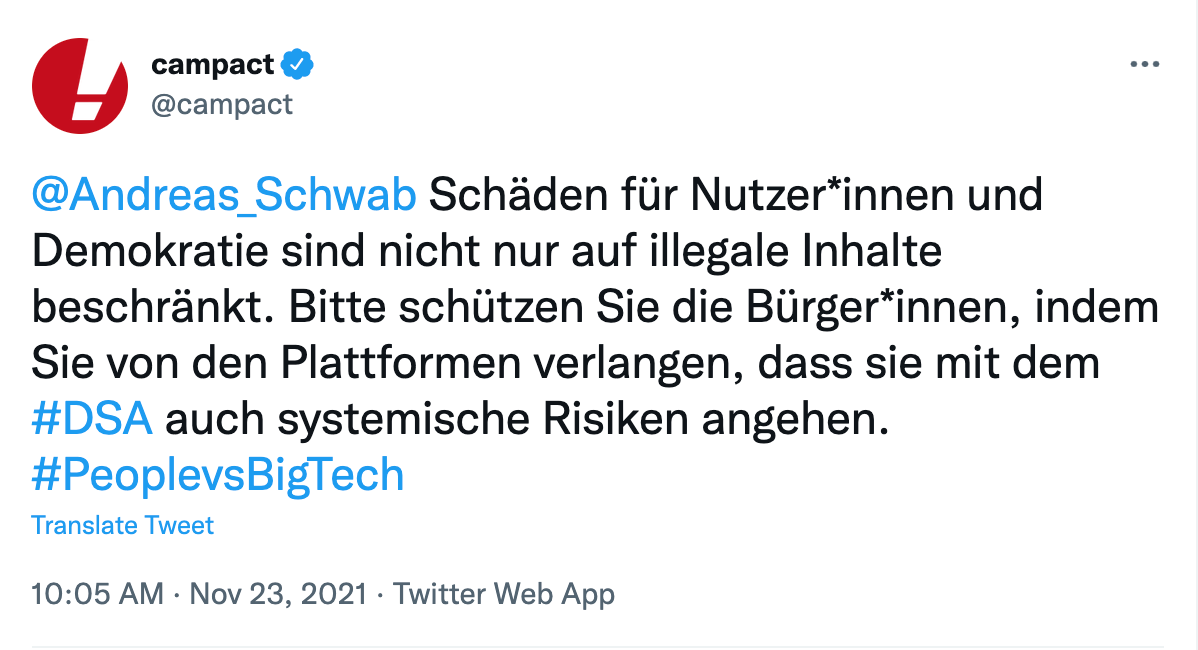
- We mobilised against and defeated a toxic trade secrets exemption, which would have provided a major loophole allowing platforms to deny NGOs and researchers access to data claiming it is a “trade secret”.

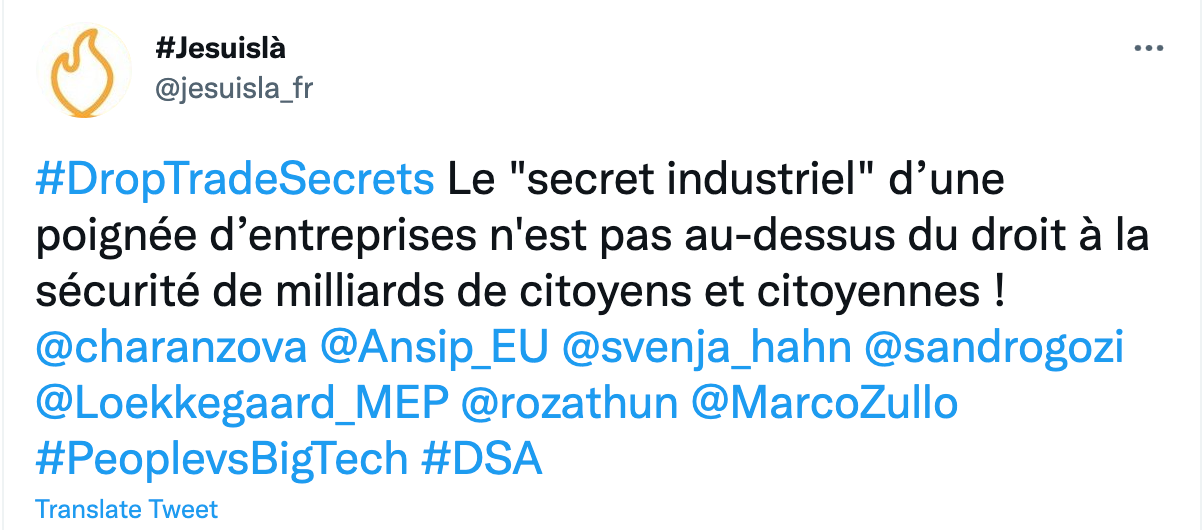
- We worked with a large number of partners to mobilise against an 11th-hour media exemption threat during the vote in the lead committee on the DSA (IMCO). The potential loophole was voted down by a significant majority, but is likely to rear its ugly head again at the plenary vote in Parliament in January 2022.
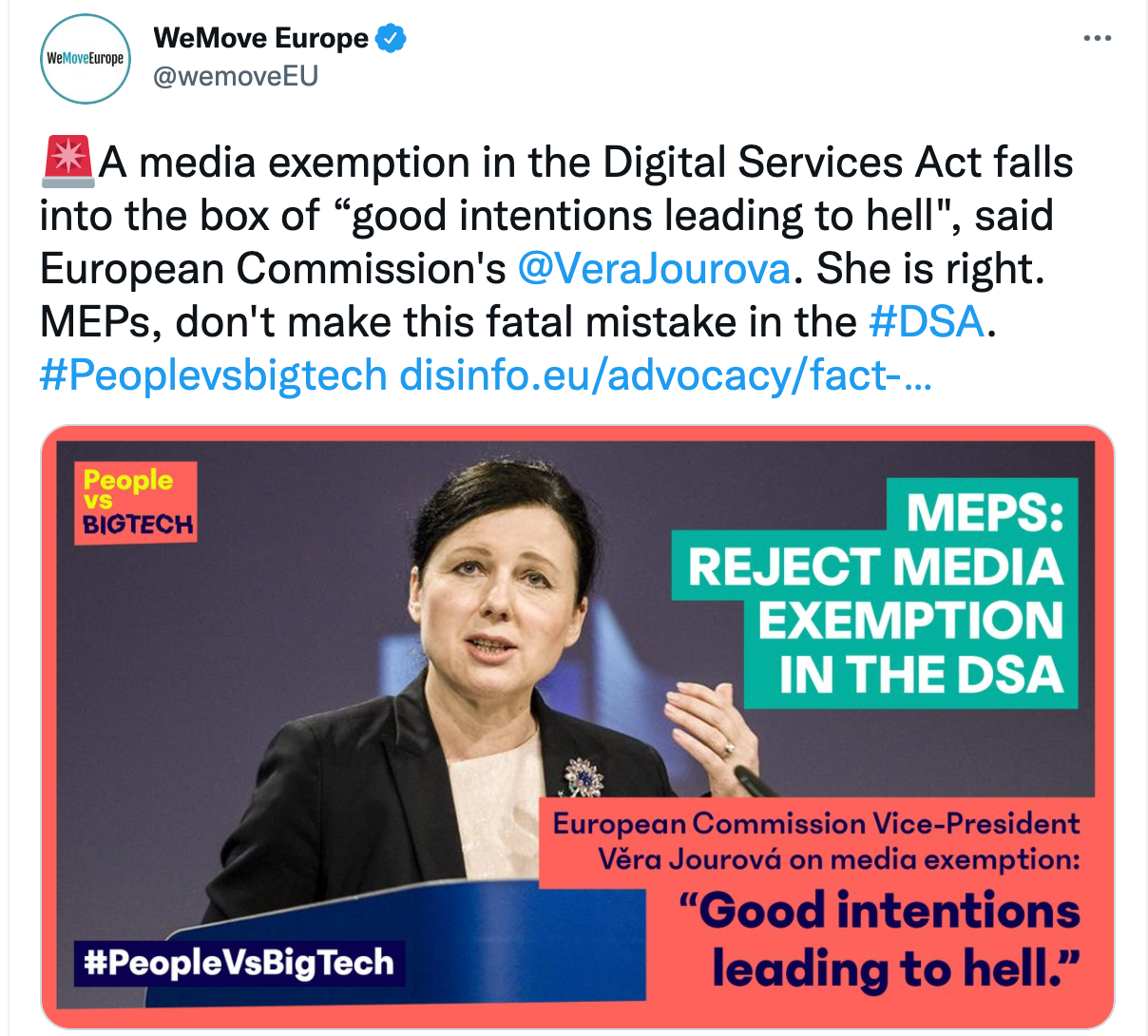

- We also worked with our partners to pen timely op-eds and coordinated six joint letters on essential issues (such as the danger of including a media exemption in the DSA, co-drafted with EU Disinformation Lab). As the message of #PeopleVsBigTech spread, it was encouraging to see members of the European Parliament (MEPs) begin to use our language and framing of the issues in their own communications.
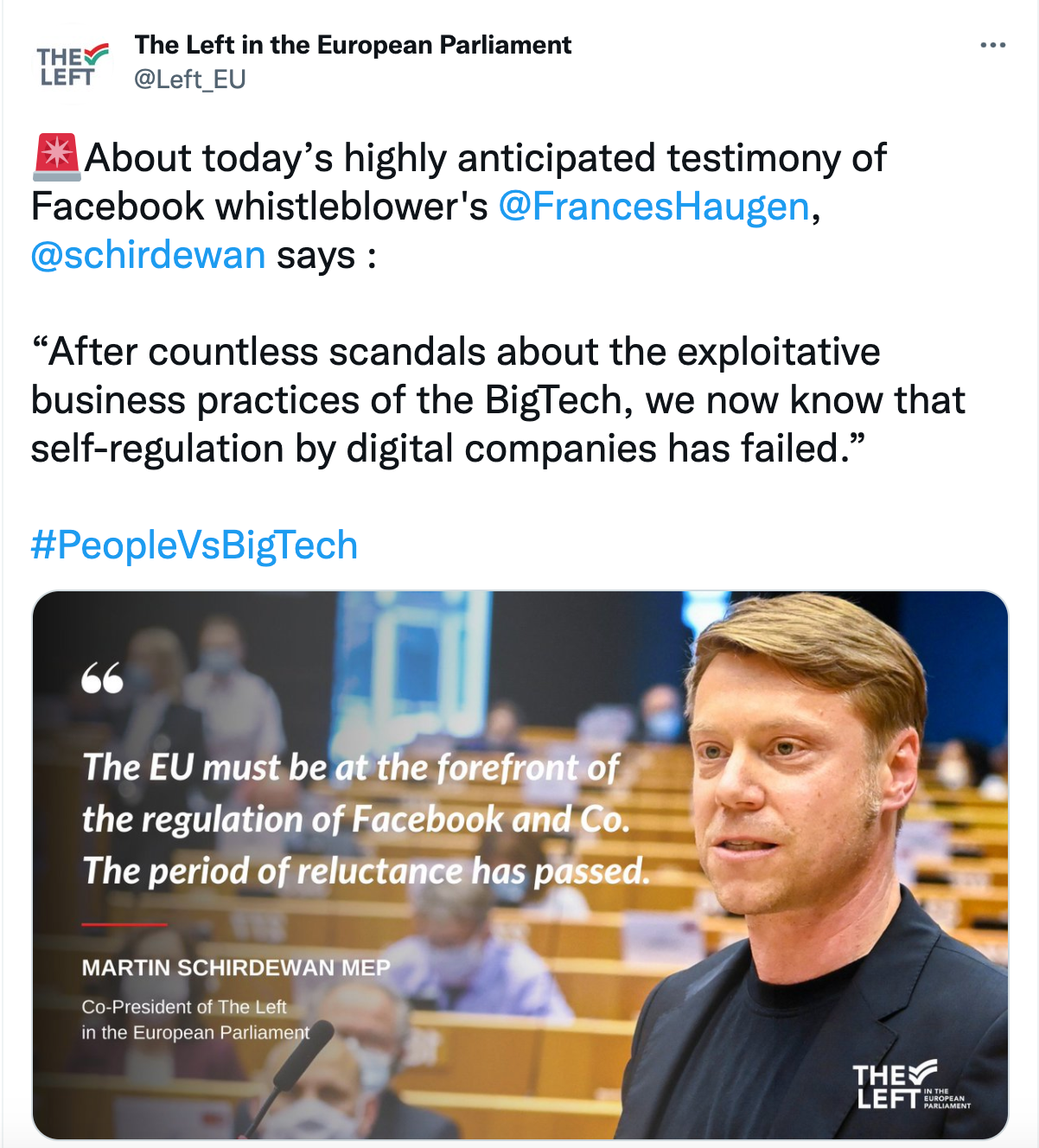
Despite this progress, there is still much more work to be done. Civil society and allied MEPs were not successful at reining in surveillance advertising in the draft DSA. This massive missed opportunity leaves the core of the toxic data extraction business model untouched and ripe for exploitation. Fortunately, however, there is still hope – through hard work and coordinated mobilisation – for improving the current compromise at the plenary vote in January.
In continuing our efforts to strengthen the DSA, we also want to see recommender systems turned off by default (with the added option of interoperability) and remain resolute in our opposition to any media exemption, the incorporation of which would open up the EU to sustained and unmitigable disinformation attacks. We will also argue for the expansion of Big Tech’s internal complaint handling system and out-of-court settlement procedures to apply to users who are victims of platform inaction (not only targets of content takedowns). This will be a very important redress mechanism for the thousands of victims of hate, disinformation, abuse and other online harms whose complaints are often simply ignored by the platforms.
Taking the #PvBT Movement into 2022
“We expect and demand that our elected representatives will stand with us.”
As 2022 begins, we are focused on continuing to make our voices heard in Europe and bringing in new voices from across the world. EU Trilogue negotiations are currently expected to take place between the end of January and end of March 2022. During this time the Parliament, the Council of the EU (made up of its 27 member states), and the European Commission will meet to negotiate the final text of the DSA and DMA. The French, who hold the EU presidency in 2022, are expected to push for a deal on at least the most sensitive items before the government is interrupted ahead of its upcoming presidential elections in May. The overall ambition is for the DSA/DMA to be adopted before mid-2022.
Given this, it will be an incredibly busy start to the new year as we make our voices heard on key issues like surveillance ads and recommender systems. With the Trilogues approaching, our attention will turn to influencing the debate at national levels – communicating the core concerns of civil society to EU member states in an effort to ensure there is no backsliding at the final stage (the Trilogues can be shrouded in secrecy, creating the potential for reneging unless constant and timely public pressure is applied). It is absolutely vital that member state politicians and ministries stand with their citizens and secure the strongest possible deal on this landmark legislation.
As the year progresses, we also want to look beyond the specific legislative battles in Europe. Revelations by Frances Haugen and Sophie Zhang underscored what civil society has said for years: Big Tech platforms disproportionately harm people in the Global South. And while the DSA may provide new tools for citizens beyond Europe to get redress, it won’t be nearly enough – nor will it have been designed with their unique needs and context as the primary concern. That’s why in 2022 we will push to build deeper conversation, connection, and solidarity between groups working on these issues around the world as we seek to create a longer-term vision for change beyond the DSA. To that end, we would love to hear from diverse voices working in this space in whatever way you or your organisation are confronting the harms of Big Tech. Email us at [email protected] to learn more and get involved today.



